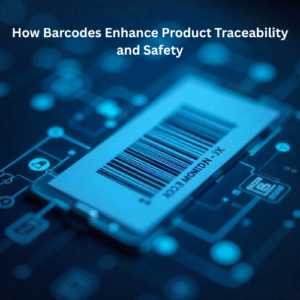
As products travel quickly across borders and supply chains in today’s global marketplace, it is more crucial than ever to ensure traceability and safety. Customers are curious about the origins of their products, the manufacturing process, and whether or not they adhere to safety and quality regulations. In turn, companies need to be able to track their products from the point of origin to the customer’s hands. The barcode is one piece of technology that enables this. Businesses can increase operational efficiency, increase transparency, and ensure safer products for customers with India Barcodes dependable systems.
The Importance of Product Traceability
Product traceability refers to the ability to track and trace a product through its entire life cycle, from production and processing to distribution and sale. This process ensures that every stage of a product’s journey can be documented and verified. In industries such as food, pharmaceuticals, and electronics, traceability is not just a regulatory requirement but also a vital component of brand reputation and consumer safety.
When businesses implement barcode systems, they create a unique digital identity for each product or batch. This barcode carries essential information such as manufacturing date, batch number, origin, and expiry date. By scanning the code, anyone in the supply chain can instantly access the product’s history, ensuring accountability and accuracy.
How Barcodes Improve Supply Chain Visibility
A major challenge in traditional supply chains is the lack of real-time visibility. Without automated systems, tracking product movement between manufacturers, distributors, and retailers becomes complex and time-consuming. Barcodes eliminate this challenge by digitizing product identification.
Every time a barcode is scanned, the product’s information is recorded in a central system. This allows businesses to know exactly where their products are at any given time. For instance, if a product is delayed or misplaced, barcode data can help trace its location instantly. This visibility enables quicker decision-making, reduces losses, and minimizes disruptions.
Moreover, barcodes enhance coordination between various stakeholders in the supply chain. Manufacturers can verify that raw materials come from approved suppliers, while retailers can ensure they are receiving authentic, untampered goods. This streamlined communication results in a more transparent and reliable distribution network.
Ensuring Product Authenticity and Consumer Confidence
Counterfeit products are a major issue affecting multiple industries, from luxury goods to essential medicines. Fake products not only cause financial losses but can also endanger consumer health and safety. Barcodes act as a defense mechanism against counterfeiting by providing each product with a unique and verifiable code.
When consumers or retailers scan a barcode, they can instantly verify the authenticity of the product. If the code doesn’t match the official database, it serves as a warning sign. This traceability mechanism ensures that counterfeit items can be quickly identified and removed from circulation.
For businesses, this authenticity builds consumer trust. When buyers know they can verify the legitimacy of a product, they feel safer and more confident in the brand. Over time, this reliability strengthens brand reputation and customer loyalty.
Enhancing Safety in Sensitive Industries
Product safety is especially critical in sectors like food and pharmaceuticals, where even small errors can have serious consequences. Barcodes make it possible to track every detail from raw material sourcing to packaging and delivery ensuring compliance with safety standards.
In the food industry, barcodes can store information about ingredients, production dates, storage conditions, and expiration periods. This data helps identify potential issues quickly, such as contamination or expired goods, before they reach consumers.
In pharmaceuticals, barcodes ensure that every medicine pack is genuine and properly distributed. Healthcare professionals can scan a barcode to confirm that the medication is approved, safe, and within its shelf life. In the event of a recall, barcodes allow for precise targeting, helping remove only the affected batches rather than entire product lines.
Data Accuracy and Error Reduction
Before barcodes, product tracking relied heavily on manual data entry, which was prone to mistakes. Even a small typing error could lead to incorrect inventory records, misplaced shipments, or compliance failures. Barcodes minimize these risks by automating data capture.
A single scan can record all relevant details accurately and instantly. This automation not only saves time but also ensures data consistency across multiple departments and systems. Accurate data means that safety measures, recalls, and audits can be handled efficiently and without confusion.
Additionally, barcodes integrate seamlessly with modern inventory management and ERP (Enterprise Resource Planning) systems. Businesses can monitor product movement in real time, generate reports, and maintain digital records for compliance, all while reducing manual workloads.
The Role of Barcodes in the Indian Market
India’s growing retail and manufacturing sectors have rapidly embraced digital solutions to improve product traceability and safety. From food producers to pharmaceutical manufacturers, companies are recognizing the importance of adopting standardized identification systems to meet both national and international requirements.
Solutions offered by India Bar code have helped many businesses streamline their labeling and tracking processes. Barcodes enable Indian sellers to meet global trade standards and enhance credibility in international markets. In a competitive economy, where consumers are increasingly aware of product safety and origin, having reliable traceability systems gives businesses a strong advantage.
Supporting Sustainability and Accountability
Barcodes also contribute to sustainable and ethical business practices. By enabling traceability, they help companies monitor their supply chains for responsible sourcing and waste reduction. Businesses can identify inefficiencies, manage recalls responsibly, and ensure that their production processes comply with environmental and ethical standards.
For consumers, traceability through barcodes offers peace of mind. They can make informed purchasing decisions based on product information, such as origin or sustainability certifications. This transparency fosters a sense of trust and strengthens the relationship between brands and buyers.
Conclusion
Barcodes are far more than just lines printed on packaging, they are powerful tools that enhance transparency, safety, and accountability in modern supply chains. By enabling real-time traceability, ensuring product authenticity, and supporting compliance with safety standards, barcodes have become essential for protecting consumers and maintaining trust.
In an increasingly connected world, where efficiency and reliability define business success, adopting barcode technology is not optional , it’s a necessity. With systems designed for accuracy and global compatibility, barcodes empower businesses to deliver safer, more reliable products while earning consumer confidence.
As industries continue to evolve and regulations tighten, barcodes will remain at the heart of traceability and product safety, safeguarding both brands and the people they serve.


